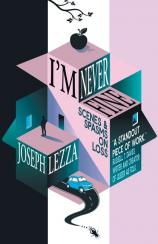I'm Never Fine: Scenes and Spasms on Loss
Review
I'm Never Fine: Scenes and Spasms on Loss
If grief was as clinically decipherable and episodically predictable as the professional caring industry often maintains, Joseph Lezza likely wouldn’t have written I’M NEVER FINE --- or, if he did, it would be a very different and much less compelling book.
But grief is a consummate and wily trickster. No matter how commonly its symptoms seem to manifest among us, it simply refuses to play by any logical rules of engagement. As happens over and over again in I’M NEVER FINE, just when it seems Lezza reaches a tenuous grasp of how past, present or impending loss could unbalance his life, it blindsides him with seemingly unrelated emotions, appetites, anxieties and obsessions.
"In its wide emotional amplitude and stark dissection of physical realities, I’M NEVER FINE counters with pathos, vulnerability and a tender germ of healing that starts its growth when we’re least aware of it happening."
This, in a nutshell, is what Lezza went through in a tumultuous time of his young adult life, leading up to and following his father’s cruelly premature death from pancreatic cancer. It’s a story that continues to this day, because “fine” is an uncontrollable and unbiddable state of being. That’s why the book’s title essay, “I’m Never Fine” (which comes near the end but also would make an excellent conclusion), sums up so much of what is wrong with how our current lifestyle treats grief and the immense pressure we are constantly under to always be “fine.”
Thinly masking itself as anger, outrage, anxiety, despair, depression, fatigue, cynicism, addiction, paranoia, eroticism, narcissism and any number of other distracting and uninvited traits, grief forced itself through every layer of defense Lezza tried (both consciously and otherwise) to pile on against it. To his credit as an author, he let it take him to internal places where most of us would not volunteer to go, even years after catastrophic personal losses. And it’s that working recognition of vulnerability that emerges in some of his most memorable reflections.
One of the few non-surprises in I’M NEVER FINE is how early in this combined memoir-anthology Lezza comes into hard adversarial contact with Western cultural conventions demanding that grief be kept in its place, emotionally tamped down and “gotten over.”
We’ve all encountered those commercial sympathy card truisms about moving on, cherishing good memories, letting go and the like. But I’ve yet to see a card urging the grieving recipient to scream his or her lungs out at whatever passes for God, and the unfairness of it all. Lezza screamed inside his car in hospital parking lots, because it had to be done, and he had to maintain an expected frozen stoicism when watching his mother weep in public across a restaurant table.
That, to a great extent, is the raison d'être of I’M NEVER FINE. Grief the trickster plays with us, seems to distort us into monstrous aberrations of ourselves, and gets us into trouble with everyone and everything “normal” around us. But in doing so it teaches us in its scary, spasmodic way how to express who we really are in a world where everything else, even true emotion, has become commodified and limited.
By giving himself permission (sometimes retrospectively) to go ape-sh*t when things were overwhelming, Lezza became/is becoming a spiritually richer human being.
You see this enrichment suddenly well up within the book as he lovingly chronicles the most mundane and unspectacular events, such as the task of shaving his dying father for the last time, turning every step into a reverent liturgical rite. It’s just one of many vignettes in which grief dials back the trickster and permits glimpses of peace and fulfillment that stand undiluted on their own.
Lezza’s adventures with grief take him to geographically distant places as well, notably Norway, where the emotional culture may seem flat but has in fact been tempered into grace by a history of hard-fought adaptation to darkness and cold. Having traveled a similar itinerary in that amazing country, I can affirm that Lezza nails the Norwegian psyche perfectly; it gave him an unselfconscious space in which to feel.
Travels in his ancestral home of Italy also opened new vistas of memory that intersect with grief in unexpected ways. Because I’M NEVER FINE branches off into various tributaries and detours of experience, the idea of grief as a moveable feast suddenly makes perfect sense. We may think we’re grieving a specific loss, whether of a parent, life partner, sibling, close friend or even a beloved companion animal. But we’re also grieving parts of ourselves that once were, or never came to be.
As Lezza paints it in prose ranging from visceral and outrageous to hauntingly gentle, grief is anything but a stand-alone experience. It’s always there --- not so much the threat lying in theatrical ambush around the next corner, but the accumulation of our many imperfect life experiences, the regrets that nevertheless teach and illuminate, the pains that allow pleasure without guilt, and the fears whose worst realities are in fact survivable.
We deny grief, trickster that it is, at our peril. By disallowing its nightmare clusters and storms of mania and desperation to have their way with us, we become less grounded, less connected and ultimately less human. In its wide emotional amplitude and stark dissection of physical realities, I’M NEVER FINE counters with pathos, vulnerability and a tender germ of healing that starts its growth when we’re least aware of it happening.
Reviewed by Pauline Finch on April 22, 2023
I'm Never Fine: Scenes and Spasms on Loss
- Publication Date: February 21, 2023
- Genres: Memoir, Nonfiction
- Paperback: 294 pages
- Publisher: Vine Leaves Press
- ISBN-10: 6185728001
- ISBN-13: 9786185728007




